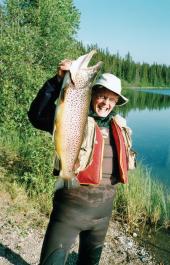
Author David Carpenter's work is imbued with a profound sense of the need for compassionate commitment between characters, and to the natural world. Born on October 28, 1941, in Edmonton, Alberta, to middle-class parents from Saskatchewan, Carpenter spent much time in the outdoors with his father and grandfather, hunting, fishing, and camping. That early ease and enjoyment of nature has been a continuing influence in his work. He earned both a BA (1962) in modern languages (French and German) and a BEd (1964) from the University of Alberta, where he was also so influenced by Henry Kreisel that he altered his career direction, earning an MA in English (1967) at the University of Oregon and then returning to the University of Alberta for a PhD (1973). Following a two-year postdoctoral position at the University of Manitoba, Carpenter joined the faculty of English at the University of SaskatchEwan in 1975.
His creative writing career was similarly serendipitous, initiated in 1976, both with poetry and, more importantly, with a lengthy unpublished novel. Particularly adept at the short story, novella and essay, Carpenter writes with compelling clarity and affection. His first published fiction may be read as a single interconnected work: Jokes for the Apocalypse, Jewels, and God's Bedfellows were all published between 1985 and 1988. A revised edition of Fishing in the West, a non-fiction work on a topic close to Carpenter's heart, was published in 1995. Two collections of his essays are also notable: Writing Home, published in 1994, and Courting Saskatchewan, an exploration of place or, more appropriately, an exploration of the definition of home, which was published in 1996. His first novel, Banjo Lessons, was published in 1997. His first collection of poetry, Trout Stream Creed, was published in 2003.
Carpenter has received critical acclaim and numerous awards for his work: Jokes for the Apocalypse was runner-up for the Lampard Award for best first work of fiction in Canada, and The Ketzer was winner of the Canadian novella contest. It was reworked into a longer novella and published as a book in 2004. Carpenter left the University in 1998 to pursue writing full time. He is married to artist Honor Keever, and they reside in Saskatoon.
Cheryl Avery